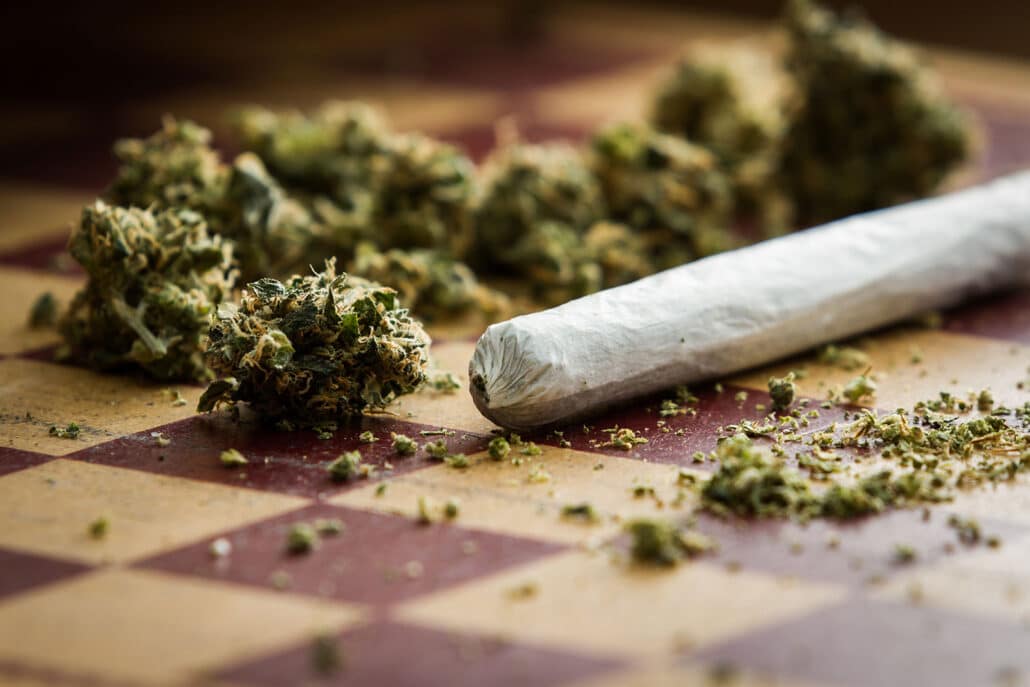Does smoking weed make you tired? If you’re a cannabis fan, you probably already have an answer to that question. That opinion is based on your personal experience and may not hold true for others.
The way weed and other cannabis products like edibles impact the body is subjective. There is a growing body of scientific research that helps us predict how different cannabinoids, terpenes, and other components of the cannabis plant may impact humans in general. Unfortunately, every human body is different, so no predicted reaction is guaranteed.
Whether weed makes you tired or has any other impact on your body may also come down to a variety of fluctuating factors, including:
- Amount taken
- Frequency of use
- Product quality
- Strain
- Levels of THC
- Other drugs or medications taken
- Overall health
- Combustion method (joint, pipe, vaporizer, etc.)
If you or someone you care about enjoys any cannabis product, it’s worth learning how components within the plant may interact with your body. Those interactions can have a significant impact on your quality of life.

TL;DR – Yes, but it can also make you feel more energized. It depends on many factors, including the strain of cannabis, your individual body chemistry, and how much you consume. Key takeaway: The effects of cannabis are highly individualized.
Table of Contents
How Cannabis Affects Energy Levels
Some of the best information we have about cannabis and energy levels comes from studies that collect information directly from consumers. One such study asked over 1,200 cannabis users to report information regarding levels of fatigue before and after consuming marijuana.
After more than 3,900 self-administered cannabis sessions, approximately 92% reported decreased fatigue after consuming cannabis. Less than 24% of participants reported symptoms associated with increased fatigue, like lack of motivation or becoming “couch-locked.”
Even more important, up to 37% of participants reported feeling more energetic, productive, or active after consuming cannabis. That’s a powerful sign that most people experience an increase in energy after consuming cannabis, but how does this natural plant trigger changes in energy within the body?
It all comes down to interactions between compounds in the cannabis plant known as cannabinoids and the endocannabinoid system (ECS).
What is the Endocannabinoid System?
The ECS is a network of receptors located in the brain and throughout the body. These receptors are responsible for processing chemical signals to trigger a variety of natural functions within the body. Everything from immune and inflammatory responses to temperature and pain control are influenced by this system.
Here’s a quick breakdown of ECS components that make this critical bodily system function:
- CB1 Receptors – Located in the brain and other critical parts of the body, these cannabinoid receptors monitor neurotransmitters and decide when to adjust activity levels for various bodily systems. For instance, they can determine when to increase or decrease body temperature and when to trigger sensations of hunger.
- CB2 Receptors – Cannabinoid receptors found naturally in immune cells, cardiovascular tissue, and the spleen. They’re responsible for assisting the immune system and potentially regulating inflammation.
- Endocannabinoids – Natural molecules produced by the body that stimulate CB1 and CB2 receptors. This triggering process is how the receptors know when to adjust bodily systems to keep us comfortable, healthy, and alive.
As endocannabinoids travel through the body and trigger these receptors, noticeable changes within the body occur. That includes metabolic changes and fluctuations in energy levels.
Cannabis and the Endocannabinoid System
When you use cannabis products, molecules from the plant can trigger CB1 and CB2 receptors. That’s due to structural similarities between endocannabinoids produced within the body and phytochemicals in the cannabis plant like THC (tetrahydrocannabinol) and CBD (cannabidiol).
Since CB1 and CB2 receptors have an impact on everything from pain and mood to sleep and hunger, cannabis can directly impact those bodily functions. They do this by triggering the receptors just like natural endocannabinoids.
So, does marijuana make you tired? The answer to that question depends on how chemicals within the weed interact with your CB1 and CB2 receptors. The result of those interactions will determine if you feel energized, a bit sluggish, or ready for bed.

Why Smoking Weed Might Make You Feel Tired
There’s a chance that cannabinoids from the weed you smoke can interact with CB1 receptors that trigger reduced brain arousal and the distribution of sleep-inducing messages. Studies have shown that inhaling marijuana allows this process to occur faster than ingesting it in edibles.
The end result is a relaxed, sleepy state that may leave you yawning and looking for your bed. That’s great if you’re using cannabis to help you get to sleep, but maybe not so great if it’s mid-day and you have to clock into work soon. That’s why it’s good to know what strains of cannabis are most likely to leave you tired.
Indica vs. Sativa for Energy
Indica and sativa are different strains of the cannabis plant. Indica is a fast-growing plant with a woody stalk that is believed to produce calmer, more relaxed moods. Sativa grows slower and is known for increasing energy and creativity.
So, does smoking weed make you tired, and which strain is most likely to do it? From those descriptions, you can probably guess that indica strains are more likely to leave you tired. That’s due to higher concentrations of the terpene myrcene, which is known to create a sedative effect.
As more varieties of sativa and indica are introduced alongside a growing array of hybrids, it’s not always so easy to predict exactly how a specific type of weed may impact you. They each have their own compound of cannabinoids and terpenes.
THC and Fatigue
Have you heard of—or perhaps experienced—a “weed hangover?” While there is some scientific backing for the claim of lingering cognitive impairment and possibly lower energy levels after consuming cannabis, most high-quality studies have failed to verify those claims.
It’s possible that some people are more sensitive to the compounds in marijuana—or specific strains—and experience those negative side effects more than others.
Lower energy levels and other symptoms similar to a hangover could come from weed varieties that contain an extremely high concentration of THC. That’s the compound in weed that produces the “high” you feel. It could also come from other cannabinoids and terpenes, which come in varying concentrations in different varieties.
Other Factors to Consider
Some consumers may describe how they feel after smoking weed as “tired” when what they’re experiencing are other effects of marijuana. For instance, THC can bind to glands inside the mouth and inhibit saliva production, leading to a dry or “cotton” mouth. That may leave you thinking that you’re dehydrated, which is often associated with tiredness.
Some varieties of weed may also contain terpenes that produce extreme relaxation and reduced ability to focus or concentrate. Smoking those varieties could lead to some people saying that they’re tired when what they’re really experiencing is extreme relaxation.

Long-Term Effects of Cannabis on Energy and Sleep
It’s important to note that the effects of cannabis tend to change over time. Even if you stay consistent in your chosen product, dosage, and frequency of use, you may find that it starts to impact you differently over time. That’s the result of your body adjusting to repeated exposure to the cannabinoids, terpenes, and other components of the plant.
If you start using cannabis as a sleep aid or get hooked and start using it long-term, there are some things to consider:
- Cannabis is known for helping users fall asleep faster, but it’s most effective during the early phases of sleep. It’s common for users to wake up later in the night.
- Long-term marijuana use can inhibit sleep quality, even if it was helpful for falling asleep in the beginning. Chronic use is more likely to lead to sleep disorders.
- The cause of your sleep problems may determine how effective weed is for helping you sleep. For instance, there’s a difference between people who can’t fall asleep due to chronic pain and people who struggle to sleep due to chronic stress and a restless mind.
When smoking weed to increase energy levels, there’s also a risk of developing dependency. You may start to notice that your energy levels don’t increase until you smoke or that they drop as the weed leaves your system. That may lead you to smoke throughout the day, which can have a negative impact on your personal relationships and career.
What to Do if Cannabis Use is Impacting Your Daily Life
If cannabis use is causing trouble in your daily life, you can try to switch strains or varieties. Different forms of the plant contain different combinations of cannabinoids and terpenes, so they trigger those receptors a bit differently. You may also need to use specific strains or varieties at different times of day for different purposes.
If that doesn’t work, you may want to consider re-evaluating your use of cannabis. If it’s causing more harm than good, you may find other strategies more effective to increase your energy levels, help with sleep, or reach other health and wellness goals.
If you find it difficult to stop consuming cannabis, it’s important to consult with a professional. Talking to someone about your marijuana dependence is critical to reassessing the plant’s role in your life. You ultimately want to enjoy a healthy, rewarding life, whether that includes smoking weed or not.

How Long Island Interventions Can Help
Long Island Interventions is your connection to a network of trained, compassionate professionals who understand the effects of marijuana. We can provide valuable resources that help you manage your health with or without the use of cannabis.
If you know it’s time to give up the weed in favor of a healthier lifestyle, we’re excited to provide the support you will need. We can help you find support programs that address all underlying concerns. Our goal is to see you thrive in life again.
Is It Time for a Change?
If you’re a chronic cannabis user, you may feel drained most of the time. You may experience low energy levels and a lack of ambition for life. Adjusting your cannabis consumption may help, but maybe not. The long-term effect of cannabis is still being researched, and it’s subjective as well.
If you want to discuss your cannabis use with a trained professional, contact Long Island Interventions today. We can help you understand what’s happening with your body and get you back on track for a rewarding, healthy life.
Published on: 2024-12-31
Updated on: 2025-04-29

